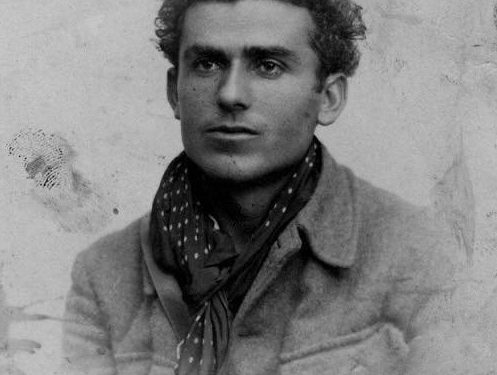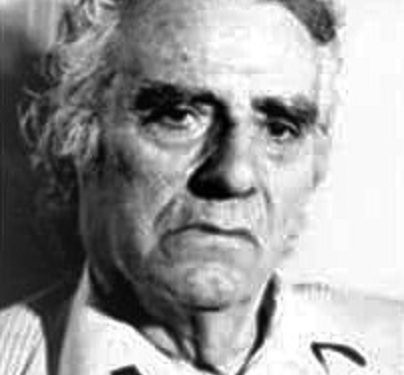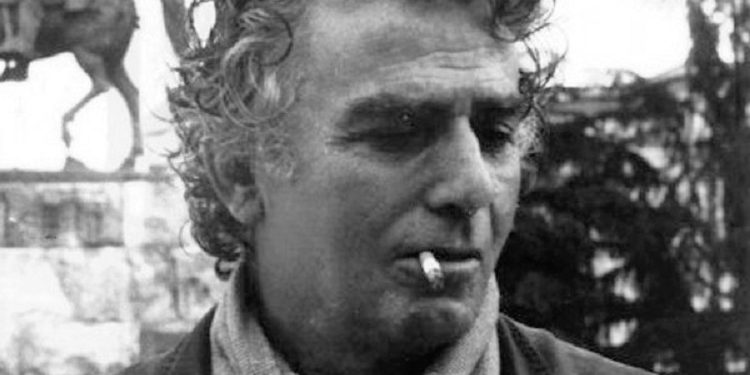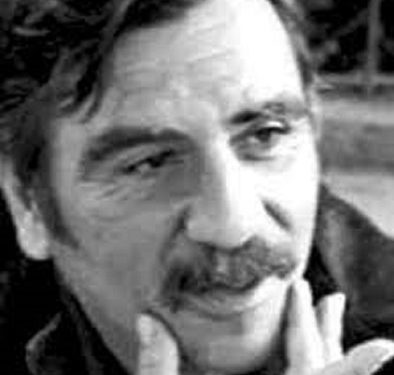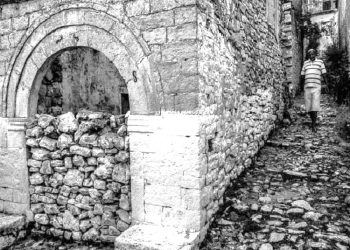By Petro Marko
The seventh part
Memorie.al / The confessions of the well-known writer Petro Marko, former fighter of the Internationalist Brigades in the War of Spain in 1936, and then also of the anti-fascist resistance in Tirana, shows the behind-the-scenes of what is known as the National Liberation War and why Koçi Xoxe hated Enver Hoxha?! Sejfulla Maleshova’s order: “This is a terrorist party; don’t open your mouth, because you will suffer…”! Why was Petro Marko sentenced and who were those who prepared his arrest and who helped him after leaving prison, etc. Selected parts from the book “Interview with myself”, by the well-known Albanian writer Petro Marko, published in the early 90s after the collapse of the communist regime, a book which had a great echo in the press of the time, after it was published and reprinted several times, and setting a sales record.
CALVARY BEGINS
THE NEXT NOVEL “THE TRAVELER’S PIECE”
In 1980, some officials suggested that I write a novel in the form of self-criticism, about my attitude towards the moral-political education of the youth, and then present it to the Party Committee. This would be the form that could rehabilitate me, as a writer and as a parent, after my son’s conditional release from prison.
I sat down, created the characters, the situations they would go through; main character, I put myself, as a writer. I tried from the first page, to the last, to be in the position as required. But the idea came to me, in addition to this commissioned creation, to bring those same characters, as well as me, not at all openly, but approximately as I thought, in another variant. I submitted the first novel, and I put the second one in the warehouse with my manuscripts.
I didn’t wait long and got a negative answer: the novel is unpublishable. The first time I wasn’t bitter. On the contrary. And now that the times are apparently changing and the dictatorial system will be overthrown, I hope to recover again, and live – when I say live, I mean work – and among the plans that remain for me to carry out, is that this novel, to enter again, this time to write without fences. Now I’m a little calmer than in the second copy, I managed to make those necessary changes, which I was grinding in my head, dictating to Arianita.
“CLOUDS AND STONES”
My dream as a creator. To date unrealized. I will tell you where I got this title, for my still unwritten work: from the confessions of my good grandmother, Mama Milles, who raised me. She confessed:
“They say that the big stones down there
in Shënma, it is the men who have returned
and died on the spot. If you are brave
white heart, if you go there at night,
hear them tell their stories.
If you are a coward and mean-spirited, you cannot listen to them.
But those men who ran away and died
on the curves, clouds have become…! They come and cry and run away
(Even my husband, who ran away and never came back, but got lost in
exile, it has been noticed: he comes crying and leaves again.)
And on the spiers below, shore air,
their tears are collected as rainwater is collected…”!
I have been building this novel in my head for years. This is the novel, dearest to me. I have put the first pages on paper, but the pen is not obeying me. I am tired, very sick with emphysema and other things of age. As far as I can see, I won’t be able to write it.
There are days when I can’t even sit in front of the typewriter. Even for these few pages, for 45 long and arduous years that I am writing for my biography, Safoja is the driving force, who surely feels that my strength is leaving me. She thinks it is necessary for me to put down on paper briefly the memories since 1945. She says that my life and my creativity have developed in stormy weather, wars, prisons, exiles, work, and various creativity, with so many episodes, events, years, dates, people, that no one else can list and remember as I can. You are right. I can write so much, now in this state that I am. I feel so sick and helpless that I don’t know when my hand will stop. In these moments of confusion, I don’t know why I remember my verses:
Seize, O beautiful wave, like a pirate,
and join me with the brave captain,
lightning-fast heart-dolphin.
At the corner of life, where our fate is written,
Let’s pour, O waves, and blow it up!
I see you too – and we – see summer!
Question: How did you experience the serious event of the boy’s arrest?
Answer: – I named my son Jamarbër. He is very talented. He is a poet, but he does not publish. He is much closed, very sensitive. During his high school years, with his class, he went to an action in the district of Tirana. When he returned from action, he had suffered a disappointment. When we talked in the evening, he addressed me with accusatory words. He said to me: “Why do you lie and talk about the happiness and prosperity of the peasantry, when I, together with my friends, saw how poor they are”?!
He was shocked by their poverty. They had been given bread and butter to eat and they had been laid out to sleep on mats on the ground. None of the boys had been able to sleep, not because of the cold, because the season was warm, but because of the words of the owner of the house. The old man had told about the misery in which they lived: they barely provided bread for the family; that he had never seen such bad days (he was 70 years old) and almost the whole village fondly remembered the time of Zog, as the time of abundance.
I told the boy, that he must have been a birder and could be an enemy of the government, since he spoke this language. And I, myself, was very saddened by this disappointment of his, since it was not necessary for the children to ascertain with their own eyes, this undeniable reality.
After that, at the end of the year, at the prom, an ugly incident happened. The envelope with the questions was opened before the exam. This became a problem in the Youth Committee. All the boys in the class were called to the meeting, they were seriously accused and it was decided that all of them should be sentenced to forced labor. In Laç, at the Superphosphate Factory, together with his friend, Fatos Lubonjen, in the heart of the working class, a new disappointment came again for the boy. He got close to the families of the workers and saw again the poverty, which reminded him of the village of Tirana. Often, he told me about the conversations he had with the workers, about their dissatisfaction. For him, this was the second disappointment, this time even bigger.
The dissatisfaction of the young people, of the boy’s friends, was also his father’s: They wanted to dress according to the Western fashion, despite the fact that they could wear lightning bolts, according to the Chinese model. They wanted to listen to foreign music, of the time, forbidden music. They wanted to read foreign, modern literature. They wanted to dance and they did so without even asking their parents. They wanted to have long hair.
But all this, the Party called degeneration and were reprehensible. Such a state also stimulated the emergence of thoughts. They accused the Party. They knew very well the law, which punishes for agitation and propaganda. There were also escapes, crossing the border, but there were also centers for serving sentences, which were in the news, such as: Spaçi, Burreli, etc. But they were not afraid, they were young.
Later, he got the right to study at the Faculty of Law, journalism branch. After the faculty, he did his internship at the newspaper “Zëri i Vlorë”, in Vlorë. It worked well there, but he increased the drink. After the internship, we waited for the appointment, which did not come. He came to Tirana, very revolted. I tried to put it in a newspaper, but to no avail. Meanwhile, his high school friend, Fatos Lubonja, was arrested and sentenced to many years. The boy’s concern started with the measures taken against me. With the situation created, with the subsequent arrests, he went into a much stressed state. At that time, my friend, Vangjush Gambeta, was also exiled and, when he was picking up his spoils and loading them into the car that would take him to exile, in Derjan i Burrel, my son approached him to help him. He had a lecturer at the faculty. Vangjushi had told him: “Go away, Jamarbër! I know you love and respect me. Run away, so no one sees you”! I, again, lost an intelligent, pleasant friend.
On August 7, 1975, at 12 o’clock at night, the boy was arrested at home. The Security people did their job, being very polite. After handcuffing the boy and taking him away, they left nothing unchecked. The son’s arrest was the worst thing in my life.
We woke up, me, Safoja and the girl, discussing that; what would wait for us?! We spoke in low voices. When morning dawned, the three of us were still, head to head, wondering what would happen next. For the girl, a student at the Institute of Arts, and for us, as creators, it was death. I was doomed, devastated, Safoja, could lose her job as a painter, at the “Naim Frashëri” Publishing House, the girl would lose the Institute and her future.
Above all, we did not know what happened to the boy. Safoja addressed a letter to Hysni Kapo. I went to the Ministry of the Interior, but they did not receive me, although I had many friends there from the time of my youth.
From that day, we began to feel the coldness of the people around us, and the departure of many friends. They were very difficult years and we excused them all. Every big car that stopped in front of our building caused, in addition to us, those who had loved us to come out of the window, thinking that they had come for the deportation.
I got in touch with the investigator, a very kind young man. He told me: “Just tell me a name, and I’ll take it out right now, take it with you.” After five months in the investigator, on December 31, 1975, the court decision was given: six years of imprisonment, for agitation and propaganda. In the first meeting with the boy, before he left for Spaç, a meeting with two pairs of irons between us, he was extremely shocked, yellow, swollen, deformed. We asked him and he was silent. He uttered only a few meaningless words for us: “I’m here, for the second”. He had thought that we were exiled, because all the time, they showed him the deportation order. We were all extremely shocked, but for me, it was the worst. That I saw my son behind bars, just like myself.
Those years were very difficult. Safoja worked day and night to support the family and the second prison. I could not work, as I no longer had the right to publish. No one approached me, but I didn’t approach anyone either. Even many close friends, who used to frequent my house, were never seen again! Only my friends from Spain never left me. The good and brave Skender Luarasi, who was heartbroken over the arrest of my son, gave me cigarettes and chocolates for him several times. But I have not held a grudge against anyone. Such was the time.
(I want to remember something related to Skender’s courage. Whenever we had an important gathering in our literary circles, Alfredi (Alfred Uçi), the son of Mina and Shega, Skender’s sister, would come and find us and order me and Manen, so that, when we sat in the meeting, we would put Skender in the middle, and force him not to react or speak, when he was revolted by the discussions of others. We laughed and promised him.) Alfred Uçi, Sofo Lazri and my old friend, Dr. Shefqet Ndroqi tried with all means in the power and party bodies, so that I could go and be operated in another European country in 1989, when my life was seriously endangered here. And they were saddened when they received negative answers.
Among all these evils, we had one joy: the girl was not removed from the Institute, although attempts were made to do so. Safo was not moved from the Publishing House. At home, we were discussing in a low voice: “Did Hysni Kapo intervene, for all this”?!
There were also people with a heart. Every month we went to Spaç and later to Ballsh, when the son moved there. I can’t forget the trips to Spaç, riding on the bodies of trucks in the middle of winter, in those harsh mountains, where the north would bite, me in a fash-fash overcoat. On these roads, I got bronchopneumonia many times, which caused me this pulmonary emphysema, which is taking my life now.
In Ballsh, because the sun was scorching in the summer, we came headlong, wet rags, on the long road without end, towards the barracks of the re-education camp. To the left glowed the oil refinery, dazzlingly twinkling like an extraterrestrial city? One day, while we were walking loaded with heavy luggage towards the camp, a group of young Chinese, who were coming from the refinery, crossed the road and, smiling, greeted us with their heads, while one of them said: “Congratulations, Petro Marko”! I was surprised!
Arianita, my little, talented daughter, whom I dreamed would become a great painter, ended up as: “qualified worker”, in the Glass Factory in Kavaje. Once, when she was only 12 years old, my friend Abdurrahim Buza, when he saw her works, said: “With this portrait, Arianita defends her degree at the Academy.”
As parents, our dreams were shattered. However, we were all alive, we had life. I thought that the three of us should not travel together, by car to Spač, because I was afraid that the car would roll over those cliffs and all three of us would die. Then what to do with the boy?
I am showing three cases:
- I was walking on the boulevard when I heard someone calling me. I turned my head and saw Dhimitër Shuterić on his balcony, who beckoned me to wait for him. He came and gave me his hand (surprisingly) and said:
– I see you walking around bent over every day. Raise your head. Who are you? What have you given to our culture… That boy is… he made mistakes… and he will come out… And you, Petro, walk with your head held high!
- One day, from the end of the boulevard, I saw my friend Koço Kosta, running down. Then I saw him turn and face me. He approached me and said:
– I will hug you once, without letting they hang me… – and he jumped on my neck.
- The other day, I came face to face with my dear friend, Dritëro Agolli. He talked to me and invited me to go to Cafe “Tirana” to drink a coffee. We sat down and he knew where he came from, because it was May 5, Martyrs’ Day, and who knew which family the martyr had been in. When he started to drink the coffee, he said to me:
– Today I have the honor to drink coffee with a living martyr!
Not even my people could come home. But my brother Agjisilla, who was crying for the fate of my son, and sister Lilo, came with us and met the boy, in the prison of Ballshi. Liloja loaded like in the village. And my grandson, Lluka, the son of Jani Markos, who was persecuted, provided me with a vehicle to go to the prison, in Spaç or Ballsh, because the drivers, if you were loaded with food for the prison, rarely took you, that they had an order.
Lluka came to meet me at home every Sunday. Agjisilla was far away, in Vlora. Only the Dunajts, my persecuted cousins, the sons of Jerasimo, when they had any trouble, came and consulted me, constantly. The only family that was not separated from us for a single day was the family of Ali Çelo, Safo’s brother, who lived with Shazije, my mother-in-law. Ali and his wife, Drita, were both chemical engineers.
Ali was a very good engineer, inventor, but all the creative work he did in his field was never recorded with his name. A kind of persecution followed him all his life, for the reason that he had been a ballistician since he was a child. At the age of 15, with friends a little older than himself, he left for Kosovo. He, together with his wife, visited my son in Spaçi and Ballshi prisons, regardless of the consequences.
It was a terrible time. We were isolated from life. And I was thinking about my struggle, about my ideal, about the suffering we endured until we gained freedom…! Killing life! Killing dreams! Killing hopes! Memorie.al




